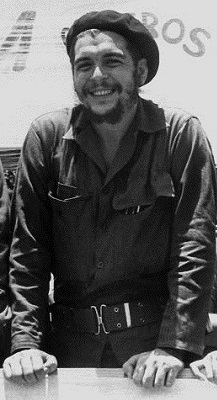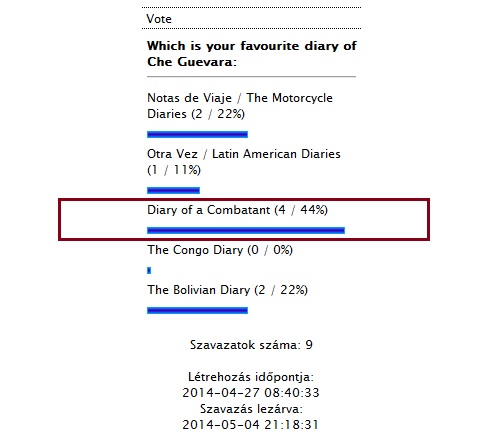|
~ Ernesto Che Guevara
~ Galéria
~ Oldal
~ Bejelentkezés
~ Vissza a Főoldalra
Ernesto Che Guevara, az argentin származású forradalmár, miniszter, gerillavezér és író, Buenos Aires-ben szerzett orvosi diplomát, majd a kubai forradalom során jelentős szerepet játszott a szigetország felszabadításában és újjáépítésében. A kubai gazdaság talpraállításáért dolgozott, küzdött az oktatás és az egészségügy fejlesztéséért, az írástudatlanság és a faji előítéletek felszámolásáért. Saját példájával népszerűsítette az önkéntes munkát. Kongóban és Bolíviában is harcolt - harminckilenc éves volt, amikor az amerikai-bolíviai csapatok csapdába ejtették és kivégezték.
| | |
|

| | |
|
|
|
Iranian dramatist writes play on Che Guevara
|
|
|
The Iranian dramatist Hamidreza Naeimi has completed a play on the Latin American revolutionary Ernesto Che Guevara.
Speaking to the Persian service of ISNA on Wednesday, Naeimi said that he spent two years studying prior to writing the play. He said that the play has a difficult script and it can be classified in the documentary theater genre. The play will be published in the near future, he added.
A major figure of the Cuban Revolution, Ernesto Che Guevara (1928–1967) was an Argentine Marxist revolutionary, physician, author, guerrilla leader, diplomat and military theorist. His stylized visage has become a ubiquitous countercultural symbol of rebellion and a global insignia in popular culture.
Source
|
|
|
| 2014.05.08. 07:52, Aleida |
The quiz - the result
|
|
|
Here are the correct answers for the quiz!
1. Where was Che Guevara born?
A: Buenos Aires B: Rosario C: Córdoba
2. Where did he get his first asthma attack? When he was ...
A: eating ice-cream B: running C: swimming
3. According to Aleida March, Che's other big love was ...
A: Cuban cigar B: chess C: taking photos
4. Whom did he meet first?
A: Fidel Castro B: Raúl Castro C: Celia Sánchez
5. Which is the job that Che never did?
A: male nurse B: photographer C: shop assistant
6. Which language did Che never learn?
A: English B: Swahili C: Japanese
7. Who was Julia Mejía? She was Che's ...
A: cousin B: doctor C: lover
8. Where was Che at the US invasion?
A: at Playa Girón B: at Pinar del Río C: in Santa Clara
9. Che once sent a postcard to Aleida with the portrait of ...
A: Mona Lisa B: Girl with a Pearl Earring C: Lucrezia Crivelli
10. Which name did Che use in the Bolivian camp?
A: Teté B: Ramón C: Adolfo
|
|
|
| 2014.05.06. 21:19, Aleida |
A quiz for You
|
|
|
Here is a little quiz for all the playful visitors of Che Guevara Siempre!
Let's see how well you know Che's life. ;) If you are not sure about the answer, of course you can check them in his biographies.
When you finished, you can send me your replies if you click on "Mit szólsz hozzá?' at the bottom of the post. But in any case, I am going to post the results tomorrow evening.
1. Where was Che Guevara born?
A: Buenos Aires B: Rosario C: Córdoba
2. Where did he get his first asthma attack? When he was ...
A: eating ice-cream B: running C: swimming
3. According to Aleida March, Che's other big love was ...
A: Cuban cigar B: chess C: taking photos
4. Whom did he meet first?
A: Fidel Castro B: Raúl Castro C: Celia Sánchez
5. Which is the job that Che never did?
A: male nurse B: photographer C: shop assistant
6. Which language did Che never learn?
A: English B: Swahili C: Japanese
7. Who was Julia Mejía? She was Che's ...
A: cousin B: doctor C: lover
8. Where was Che at the US invasion?
A: at Playa Girón B: at Pinar del Río C: in Santa Clara
9. Che once sent a postcard to Aleida with the portrait of ...
A: Mona Lisa B: Girl with a Pearl Earring C: Lucrezia Crivelli
10. Which name did Che use in the Bolivian camp?
A: Teté B: Ramón C: Adolfo
|
|
|


| 2014.05.06. 00:00, Aleida |
What You Don't Know About Cuba Tells You About YOUR Future
|

|
|
My wife, Peggy and I and 14 Berea College students are leaving for three weeks in Cuba beginning on Monday (May 5th). We'll return on the 25th. So I probably won't be writing here till then.
Last Wednesday night, Thursday evening, as well as Friday morning and afternoon, Dr. Cliff Durand -- the co-founder of the Center for Global Justice in San Miguel de Allende, Mexico -- helped us all understand what we're getting into. Cliff has been leading delegations to Cuba for the last 25 years. He's an honorary member of the faculty at the University of Havana.
Here are some of the salient ideas he shared:
1. One cannot understand Cuba's revolution without understanding neo-colonialism. Neo-colonialism refers to the dynamics of control whereby "former" colonies continue to be governed by their colonial masters even after "independence." The control remains because the now-liberated colony continues its economic relationships with its "mother country." Of necessity, these relationships foster a dependency similar to that which characterized the original colonial relationship.
[Read the whole article]
|
|
|


| 2014.05.05. 00:00, Aleida |
The result of the voting
|

|
|
As the time is over, I would like to share the result of the voting with you.
As you can see, the Diary of a Combatant absolutely won, having collected four votes out of nine - while the poor Congo Diary received no vote at all.
To be honest, I am not really surprised as Congo Diary isn't my favourite either, it has got some interesting features but somehow it is so depressing.
I would love to say THANK YOU for all those nine people who devoted their time to vote for their favourite diary.
As I am going to be offline till tomorrow afternoon because of my job, I would like to call your attention to the fact that I won't deprive you of an update.
At midnight (so within two and a half hours) an interesting article is going to appear on the website automatically, so it is worth returning today! ;)
This time I cannot let you know through Facebook and Twitter (because I need to go to bed earlier), that is why I chose this way to inform you.
|
|
|
| 2014.05.04. 21:24, Aleida |
| | |
|
|
|
~ Ernesto Che Guevara
~ Gallery
~ Site
~ Log in
~ Back to the Main page
Ernesto Che Guevara, the Argentine-born revolutionary, minister, guerrilla leader and writer, received his medical degree in Buenos Aires, then played an essential part in the Cuban Revolution in liberating and rebuilding the country. He did his best to set up the Cuban economy, fought for the improvement of the education and the health system, the elimination of illiteracy and racial prejudice. He promoted voluntary work by his own example. He fought in the Congo and in Bolivia - he was thirty-nine years old, when he was trapped and executed by the joint American-Bolivian forces.
| | |
|
|

